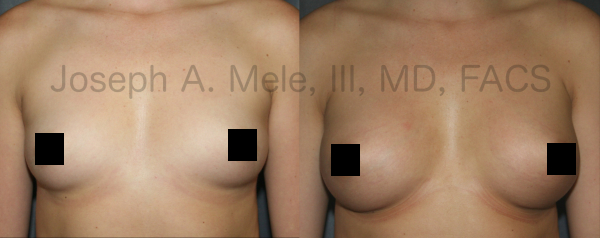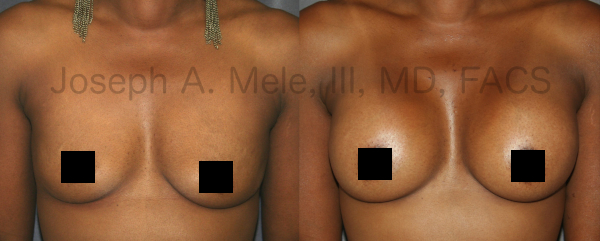Today, Breast Implants come in different shapes, sizes and materials. For experienced board certified plastic surgeons, these are exciting options that provide us with the opportunity to customize your look and maximize your results. However, for patients, too many options can sometimes lead to overload and confusion. Today’s post will help navigate through the alternatives available for breast augmentation. There is no substitute for an in-person consultation appointment with a Board Certified Plastic Surgeon. Until then, the following is a brief introduction to the currently available breast implant options to get you started on your way.
Breast Implant Fillers – Silicone Vs. Saline

These breast augmentation before and after pictures show results using silicone gel breast implants. (Click image for uncensored view.)
All breast implants have silicone shells and are classified as either silicone gel or saline depending on the filler. The current Silicone Gel Breast Implants are more popular than saline because today’s Silicone Gel is highly cohesive. This extra high strength gel is safer and more predictable because it does not flow. It supports the shape of the breast implant shell while remaining soft to the touch. Consequently, silicone gel filled breast implants have a lower incidence of rippling when compared with saline. They are also available in a greater variety of sizes, shapes and profiles. Moreover, my patients who have had both silicone and saline filled breast implants, prefer the look and feel of silicone implants.
Saline Breast Implants are also excellent devices. Saline is water with 0.9% salt (NaCl) added to make the solution as salty as we are. It is the same fluid we administer intravenously for hydration during emergencies and as a delivery medium for medications during surgery. Saline breast implants also come in a variety of shapes, sizes and profiles, but they tend to be more palpable and have a higher incidence of rippling (visible wrinkling). An advantage of saline is that it is much simpler to tell when a saline breast implant deflates. If a hole develops in the implant’s shell, the saline empties quickly and completely. Conversely, highly cohesive gel, with is found inside silicone breast implants (gummy bear implants), maintains its shape and fullness, even when there is a hole in the shell.
Breast Implant Shape – Round Vs. Teardrop
The final shape of the augmented breast is determined to a greater extent by the shape of the natural breast than by the shape of the breast implant. Most women already have most of their breast tissue in the lower pole of their breasts. Thanks to gravity, the majority of the breast implants’s volume also fills the lower half of the breast, so round implants do not necessarily mean round breasts.
Unlike shaped implants, round implants are axially symmetrical. That means round breast implants can spin without affecting the shape of the breast. For shaped breast implants, rotation is a significant problem. To help prevent rotation, shaped implants have a textured surface. The rough surface attaches to the inside of the capsule like Velcro®, hopefully preventing rotation. Unfortunately, texturing may also increase the risk of rippling and double capsules.
Shaped implants may be beneficial after a mastectomy and in congenital cases when the breast does not fully develop. Any likely benefit needs to be evaluated against the risks on an individual basis. Texturing is discussed later in this article.
Breast Implant Profile – Low, Medium, High Vs. Extra High

The above breast augmentation before and after pictures show breast augmentation with high profile silicone gel breast implants. (Click image for uncensored view.)
The greatest innovation in implant shape has been the introduction of multiple breast implant profiles. Selecting the best profile often causes confusion, but hopefully this will help simplify the selection process. High profiles have greater projection for a fixed diameter. That means for a fixed width, high profiles are rounder and fuller. This means they are larger and project out from the chest more. My patients all want rounder, fuller breasts, but unless they are looking for maximum size, not everyone is a good candidate for high profile breast implants.
It’s easier to consider profile in terms of the diameter of the implant rather than how round it is because the base diameter of your breasts are fixed. They can’t be changed. The base diameter is an objective dimension that is easily determined during your consultation appointment. All it takes is a tape measure. From this measurement, the optimal diameter of your breast implant is determined. If the implant is too wide, it sticks out too far under the armpits. If the implant is too narrow, the cleavage gap between the breast implants is increased. The breast implant diameter is very important, objective and easy to determine.
To determine the best profile, we need two pieces of information. One is the measured breast diameter. The other is your goal size – i.e. the size you would like to be after breast augmentation because this determines the volume required for you breast implants. The volume of your natural breast tissue plus the volume of the breast implant determines the final size of the breasts. In other words, the goal size minus your current breast size equals the volume of the required breast implant.
Since the goal size is subjective, it is worth doing some homework. A good way to try on different sizes is to fill Zip-Lock® bags with rice and place them inside the bra you would like to wear after augmentation. Often, patients bring their optimal rice bags with them to the office to convey their desired result. It can be very helpful. Once we have determined your goal size and the base diameter of the breast is measured, we can choose the profile that fits the bill. All measurements and profiles should be confirmed with in-person guidance from an experienced board certified plastic surgeon.
Breast Implant Size – Too Small, Too Large Vs. Just Right

These breast augmentation before and after pictures show the front view for breast augmentation using saline breast implants. (Click image for uncensored view.)
Choosing the correct breast implant volume is the most difficult aspect of breast implant selection. Everyone wants to be big enough, but not too big. I’ve had it described in many ways from noticeable, but guys should still make eye contact, to celebrity but not porn star. It all very subjective. Your “ideal” may not be mine, or your friends, so you need to be honest with yourself. If you give your board certified plastic surgeon a good idea of your goal size is, you have a much better chance of being satisfied with your final result. Wearing padded bras, using rice bags, sizers or bringing pictures to your consultation appointment all aid in size determination. Once I know what size a patient wants, the rest is measuring and math, and I like math.
Breast Implant Texture – Smooth Vs. Textured
I have always been a fan of smooth breast implants, primarily because of the excellent results they provide for my patients. They are simple, predictable and reliable, and for most patients they feel softer yet still give a teardrop shaped result. For cases of recurrent capsular contracture or when shaped implants are indicated, then texturing may provide an advantage, but recently texturing has been associated with an additional risk.
Textured Breast Implants have been in the news a lot lately, and in the future, some texturing may no longer be an option. Just this week, Allergan® voluntarily recalled its Biocell® textured breast implants from the world market. Biocell® was the most aggressive texturing and has an increased association with breast implant-associated anaplastic large cell lymphoma (BIA-ALCL). Of the 573 cases of BIA-ALCL, 481 are reported to have Allergan® textured breast implants at the time of diagnosis.
This may seem like a lot of BIA-ALCL cases; however, there are millions of breast implant patients. If you have textured breast implants, your risk of developing BIA-ALCL is 1 in 20,000 or 0.005%. If you have Biocell® textured breast implants, your risk of developing BIA-ALCL is 1 in 3345 or 0.02%. By comparison, the risk of developing breast cancer is one in eight or 12.5%. Biocell® textured implants manufactured by Allergan®, represent less than 5% of breast implants sold in the U.S. In fact, textured implants account for only 10% of all breast implants sold in the US.
It is important to note that Allergan smooth and Microcell® breast implants are not impacted by the recent recall. If you do have Allergan® Biocell® textured breast implants and have no symptoms, the FDA does not recommend the removal of these or other types of breast implants due to the low risk of developing BIA-ALCL. If you have any questions, talk to your health care provider. If you have breast swelling, especially if it is one sided, or any other symptoms of BIA-ALCL, it is important to seek prompt medical follow-up with a board certified plastic surgeon for further testing. Like most medical problems, early diagnosis is associated with increased cure rates.
Breast Implant Makers/Warranties – Allergan®, Mentor® Vs. Sientra®
Sientra®, Allergan®, Mentor® and Ideal® are the four FDA approved breast implant manufacturers in the United States. Sientra® manufactures their implants in the US and only makes silicone gel filled breast implants. Allergan® and Mentor® make both Silicone and Saline filled breast implants, and Ideal® makes only saline filled breast implants. These are the only FDA approved breast implant companies in the US.
All US manufacturers of Breast Implants have breast implant warranties. The details vary between companies. I try to keep the latest information on my website’s Breast Implant Warranties Page, but for the most accurate and up-to-date information, please check with your implant’s manufacturer.
Breast Augmentation Consultations
To schedule a personalized Breast Implant Consultation, call (925) 943-6353 today. An in-person consultation with a Board Certified Plastic Surgeon can help you focus on the options specific to your needs and can save you a lot of time when considering Breast Augmentation.
Previous Post Next Post